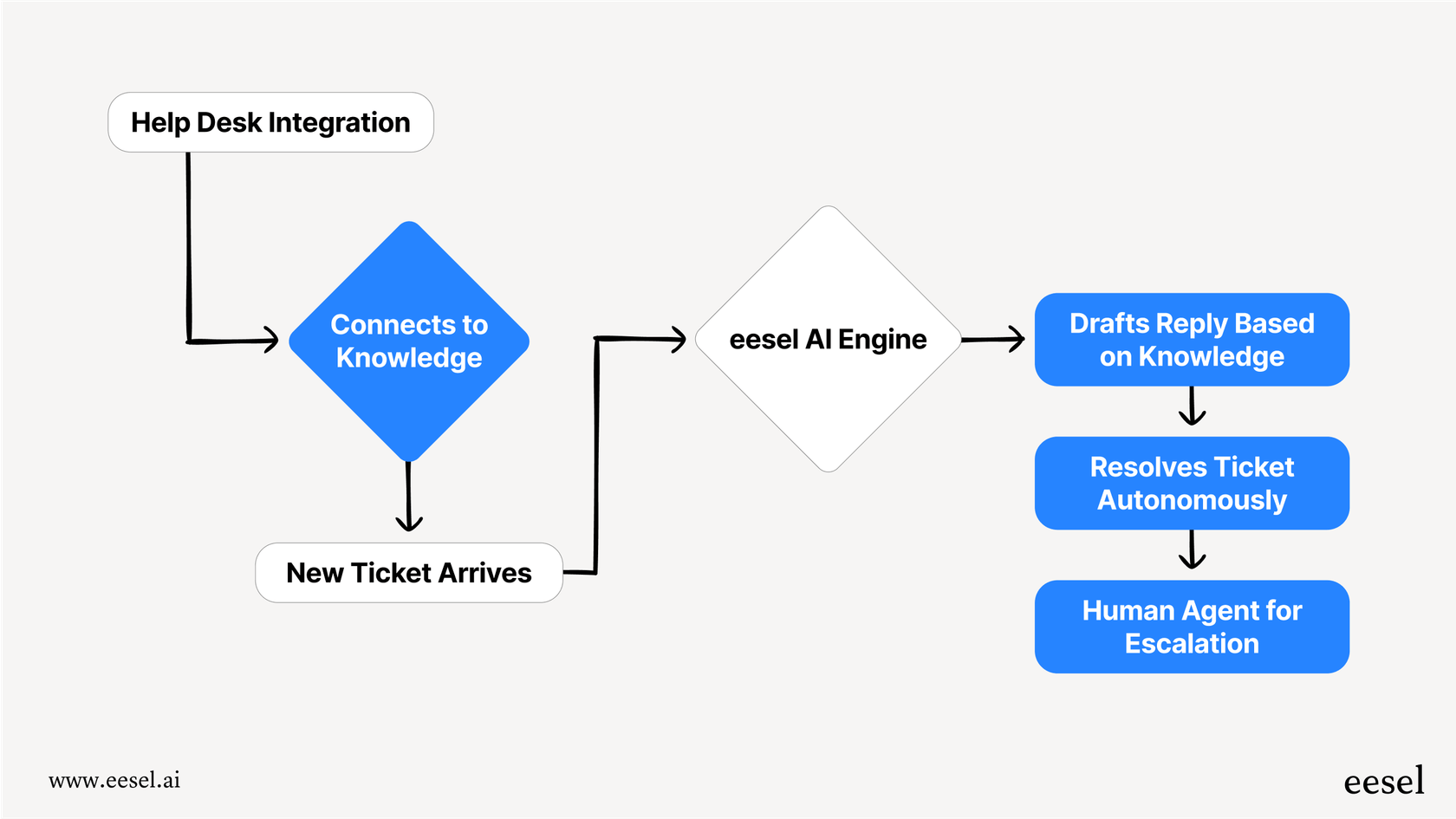
Let's be real: WhatsApp is a massive part of how we communicate. With over 2.8 billion people using it and message open rates hitting an almost unbelievable 98%, it’s pretty much the most direct line you can get to your customers. That’s why Meta's recent announcement about the WhatsApp Business Platform 2025 updates for AI and campaigns has gotten so much attention.
These aren't just small feature updates. Meta is rolling out changes that could seriously reshape how you handle marketing, sell your products, and support your customers. We're going to walk through everything you need to know about the new unified campaign management, the smarter AI tools, and the new voice features. The goal here is to help you streamline your work, get better at personalization, and make your conversational commerce efforts really pay off.
What is the WhatsApp Business Platform?
Before we jump into what's new, it’s worth clarifying that WhatsApp has two different tools for businesses, and they're built for completely different scales.
There's the WhatsApp Business App, which is free and great for small businesses or solo operators. It's designed for managing a relatively low number of customer chats by hand, right from a single phone or computer. Think of it like a souped-up business line on your phone, with extras like a business profile and some pre-written quick replies.
Then you have the WhatsApp Business Platform (API), which is what all these 2025 updates are for. This is the heavy-duty solution for medium and large businesses handling tons of conversations. It doesn't come with its own inbox. Instead, the API hooks directly into the software you already use, like your helpdesk or CRM. This connection is what allows you to bring in AI and chatbots, let multiple agents handle chats, and run big marketing campaigns. All the new AI and campaign tools are built for the API, because that's where the real scaling happens.
A breakdown of the key 2025 updates
Meta announced three core updates at its recent Conversations conference. Let's dig into what they are and what they actually mean for how you talk to your customers.
1. Centralized campaigns
If you've ever run ads across Meta's apps, you know the pain of jumping between different dashboards. Well, they're finally fixing that. The biggest change is that you can now build and run marketing campaigns for WhatsApp, Facebook, and Instagram all from one spot: Meta Ads Manager. This makes the whole process of running a campaign across different channels feel much more connected.
Here are a few of the immediate wins:
-
A single workflow: You can finally use the same images, copy, setup process, and budget for all three platforms. No more rebuilding the same ad in three different places.
-
Smarter ad spend: You can lean on Meta's Advantage+ to let its AI figure out the best place to spend your budget. It automatically shifts money to the placements that are getting you the best results.
-
Easier list management: It's now much simpler to upload your contact lists and officially choose WhatsApp as a destination for your marketing campaigns.
Bringing campaigns under one roof is a huge win for efficiency, but it does create a new kind of headache. When a customer can click an ad and start a chat from anywhere, you get questions coming in from all sides. It's tough to give everyone a consistently good answer when your company knowledge is spread out across a dozen different documents and platforms.
This is where a single source of truth becomes so important. A tool like eesel AI works like a central brain for your entire company. It plugs into all your knowledge sources, whether it's your public Zendesk articles, internal team wikis on Confluence, random Google Docs, or even the history of your past support tickets. This ensures your AI gives the right answer every time, no matter where the customer is reaching out from.

2. Next-generation business AI
Meta is also putting a lot more muscle behind its "Business AI." The idea is to help businesses use AI to handle conversations more effectively and, ultimately, turn more of those chats into sales.
The new AI aims to be a more active participant in the sales process.
For instance, it can now offer personalized recommendations. By looking at a user's chat history, the AI can suggest products it thinks they'll like, turning a simple support query into a sales opportunity.
It can also act as a sales assistant. If a customer is trying to buy something on your website, the AI can guide them through the process and then follow up in the WhatsApp chat to confirm the order or answer any last-minute questions.
And it doesn't stop after the purchase. The AI can proactively send follow-ups, like shipping updates, or check in later to see if the customer needs help with their new product.
These are definitely cool features, but Meta's built-in AI can sometimes feel like a "black box." You don't get much say in how it responds, the tone it uses, or the specific actions it can perform. For any business that cares about its brand voice and providing a perfect customer experience, that lack of control can be a deal-breaker.
This is where a solution like eesel AI puts you back in control. Instead of being stuck with a one-size-fits-all AI, you get a system you can completely customize.
-
You choose what to automate: You get to decide exactly which kinds of questions the AI handles. You can start small, letting it take care of the easy, repetitive stuff, and have it automatically pass more complicated issues to a human agent.
-
You define the personality and actions: With a straightforward prompt editor, you can craft your AI's exact tone of voice. You can also connect it to your other systems (like Shopify) to do custom tasks, like looking up an order status or updating a customer's profile.
-
You can test it without any risk: eesel AI includes a simulation mode that lets you test your AI on thousands of your own past support tickets before it ever talks to a real customer. This gives you a data-driven forecast of how it will perform, so you know exactly what to expect when you go live.

3. Expanded conversational and voice features
Meta gets that some problems are just easier to solve by talking. That's why they're adding voice and video calling right into the platform, making conversations feel more immediate and personal.
These new options are geared toward larger businesses and allow for a few new things:
-
Customers can now tap a button to start a voice or video call right from within a chat.
-
Businesses can call customers who have opted in to receive them.
-
You can now send and receive voice messages, which is perfect for those detailed, back-and-forth support issues that are too clunky for text.
When you combine these new voice features with existing tools like WhatsApp Flows (which let you build simple apps inside a chat for things like booking an appointment), conversations get a lot more sophisticated. Customers will expect quick, correct answers, whether they're on a call or tapping through a form.
To keep up, your AI needs to know more than just what's in your public FAQ. eesel AI is built to learn from everything. It reads your past support conversations, internal wikis, and private notes to understand the real nuances of your business. That deep context is what allows it to solve the kind of tricky problems that might pop up on a phone call, so your human agents can stay focused on the truly complex issues.
Understanding pricing for the WhatsApp Business Platform
It’s important to know that the WhatsApp Business Platform isn't a free service. It works on a conversation-based pricing model, meaning you pay for each 24-hour conversation you have with a user. The price for each conversation depends on who started it (you or the customer) and what kind of message it is.
There are four categories of conversations:
| Conversation Category | Description |
|---|---|
| Marketing | Promotional offers, product announcements, or other messages to drive sales. You initiate these. |
| Utility | Transactional updates a user asked for, like order confirmations or shipping alerts. |
| Authentication | One-time passcodes for logging in or verifying an account. |
| Service | Any conversation started by a customer looking for support. The 24-hour clock starts when you first reply. |
Prices change depending on the region, but generally, marketing conversations cost the most and service conversations cost the least. On top of Meta's fees, you'll also have a platform fee from whichever WhatsApp Business Solution Provider (BSP) you use to connect to the API.
Here's a nice little perk, though: when a customer clicks one of your "Click-to-WhatsApp" ads on Facebook or Instagram, the first 72 hours of that conversation are free.
Preparing your strategy for the 2025 updates
These 2025 updates make one thing crystal clear: WhatsApp is way more than just a messaging app now. It's becoming a central hub for marketing, sales, and support, and it needs to be treated as a key part of your overall customer strategy.
But getting ready for these changes doesn't mean you need to throw out all your current tools and start over. The best way forward is to find tools that make your existing setup better, not force you to rebuild everything.
To really make the most of these new features, you'll want an AI platform that plays nice with the tools you already have. eesel AI is designed to do just that. It plugs right into your helpdesk and connects to all your knowledge sources, letting you launch a smart, fully customized AI agent in minutes. It's all about making your team more capable without forcing you to switch platforms, which is exactly what you need to navigate the future of conversational commerce.

Frequently asked questions
These updates significantly streamline marketing, sales, and support by centralizing campaigns, introducing advanced AI for personalization and sales assistance, and expanding voice and video options. They aim to establish WhatsApp as a central hub for conversational commerce.
Businesses can now manage WhatsApp, Facebook, and Instagram campaigns from a single Meta Ads Manager dashboard, utilizing a unified workflow and budget. This approach enhances efficiency in ad spend and simplifies contact list management across different platforms.
The updated Business AI offers personalized product recommendations, acts as a sales assistant to guide purchases, and proactively sends follow-ups such as shipping updates. This helps businesses convert more chats into sales and improves post-purchase engagement.
Yes, customers can now tap a button within a chat to start a voice or video call directly with a business. Businesses can also initiate calls with opted-in customers and utilize voice messages for more detailed support interactions.
The platform operates on a conversation-based pricing model, where you pay per 24-hour conversation, categorized as marketing, utility, authentication, or service. Marketing conversations generally incur the highest cost, while service conversations are the least expensive.
Businesses should focus on integrating AI platforms that seamlessly work with their existing tools and knowledge sources, like CRMs and helpdesks. This ensures consistent, accurate responses across all channels and maximizes the benefits of the new features without necessitating a complete system overhaul.
Share this post

Article by
Stevia Putri
Stevia Putri is a marketing generalist at eesel AI, where she helps turn powerful AI tools into stories that resonate. She’s driven by curiosity, clarity, and the human side of technology.







